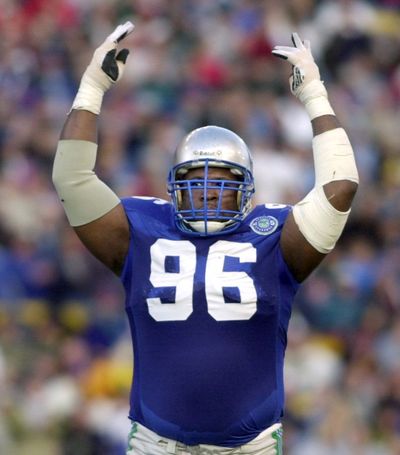Lifelong Seahawk Kennedy prepares to enter Hall of Fame

SEATTLE – The worst season in Seahawks history was a showcase for one of the best players.
Not just for the franchise, but for the NFL. That’s why Cortez Kennedy is about to be busted in the birthplace of professional football. Kennedy will be inducted today into the Pro Football Hall of Fame, his shaved head crafted as a bronze testament to what was more accurately a 24-carat career.
And he was ours here in Seattle, enduring 11 starting quarterbacks. He was on the team that went 2-14 in 1992, a year in which the team went more than two games without scoring. He never won a playoff game and yet he never wanted to be anywhere else.
“I loved playing for the Seahawks, you know,” he said. “I didn’t want to go anywhere else.”
And he didn’t. He stayed here through Dan McGwire, Kelly Stouffer and Rick Mirer. He endured the four-year terms of coaches Tom Flores and Dennis Erickson, which didn’t produce a playoff berth.
Wait. Endured is not quite right.
He thrived.
He was the most memorable player in what was otherwise a largely forgettable decade in the team’s history. Kennedy stood out – such a singular force of nature that he could be identified by only half his first name. He was ’Tez.
“There is no one more deserving of this than Cortez,” said Mike Holmgren, who coached Kennedy his final two seasons. “I got him near the end of his career. He’s such a good man, such a pleasure. We maintained a friendship. He’s one of the good guys.”
Kennedy retired a Seahawk, a significant fact in today’s world of vagabond superstars. Ken Griffey Jr., Randy Johnson, Alex Rodriguez, Gary Payton. All future Hall of Famers and each left Seattle for one reason or another.
But Kennedy remained a Seahawk, named to the Pro Bowl in eight of the 11 seasons he played. Even when the team decided to cut him after the 2000 season, and other teams like the Dallas Cowboys came calling, he never played for another team.
“One thing I can say,” Kennedy said, “is that the Seahawks wanted me there, so that worked out well, too. They wanted me to stay with the Seahawks for my whole career.”
He grew up in Arkansas, and has a street named after him in Wilson. He played two seasons at a Mississippi junior college, transferred to Miami and was chosen No. 3 overall by the Seahawks in the 1990 draft.
He was the best thing about the Seahawks during the period between the end of Chuck Knox’s time in Seattle and the start of Holmgren’s decade-long run. A bright spot in the Dark Ages of Seahawks football. It’s an era that will be remembered for moving vans, four different head coaches in a decade and exactly one playoff appearance.
Kennedy was named NFL defensive player of the year in 1992, one of five times in 40 years that the award went to a player from a losing team. And it is the only time it went to a player whose team finished last in its division.
Of all Kennedy’s achievements as a player, one of the most remarkable is that he was never defined by his surroundings. He transcended them.
In Kennedy’s 11 seasons, the Seahawks had seven years in which they won seven to nine games.
Football has been called the ultimate team game, and that’s true. But it’s a good thing the team isn’t the only way to measure a player – otherwise Kennedy would have been doomed to being overlooked.